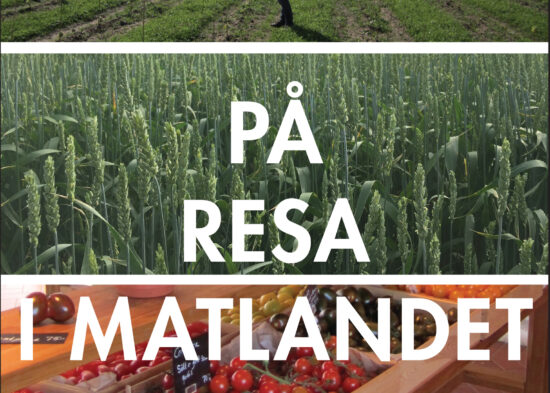Results from the project
Matturismen kan ge landsbygden ett lyft
På resa i matlandet
Smaker som sjunger
Karin M. Ekström, Professor, School of Business and IT, University of Borås, and Håkan Jönsson, Associate Professor, Department of Arts and Cultural Sciences, Lund University
What is the research project about?
“There is currently considerable interest in gastronomy, food and meals – culinary tourism has grown strongly and become increasingly important for the Swedish hospitality sector in recent years. Despite these successes, we are still lagging behind leading countries such as France, Italy and South Africa, and the level of profitability for parties such as fine food creators, farm shops and restaurants is low. We will be studying the growth of culinary tourism – the conditions that govern it, the challenges and opportunities that exist and whether there are any specific obstacles to growth. We will investigate how the potential within food and gastronomic cooking can be utilised to create a positive experience of a place, and how this can strengthen an existing visitor destination.”
What is culinary tourism?
“One way of defining this is that food and drink must be included in the actual planning of the journey and that this must be an important part of the experience. However, it is not exactly easy to investigate this. Food is a long way down the list when you ask tourists about their reasons for visiting a particular destination, although when you ask them after their journey what they remember best, it comes significantly higher up. Measurement problems have no doubt contributed to people working in the hospitality sector occasionally underestimating the role of food.”
How will you proceed?
“We will be working with an ethnographic method, carrying out case studies and interviews, including at farm shops in Skåne and Sjuhäradsbygden and the surrounding area. We will also be studying the role of food in tourism at events, trade fairs and at travel destinations, such as the Eurovision Song Contest in Malmö and at Gekås in Ullared, which is consciously focusing on food. We will be looking at the entire entrepreneur chain, from producers and distributors to consumers, and in order to obtain a comprehensive picture, we will also be studying how development organisations (organisations for destination and food development) interact with politics, social structures and policy level.”
How can the hospitality sector benefit from this research?
“Our hope is that the results will be used for development work within culinary tourism and for the marketing of the whole of Sweden, regions and specific locations as culinary destinations. We also hope to obtain knowledge about how interest in regional and local aspects can be converted into successful companies, as well as how the work of entrepreneurs can be linked with investments in regional and local development. There are many entrepreneurs in the area, some of whom are succeeding while others are not. We will be looking at the reasons for this and hope to be able to chart success factors. In order to create sustainable development within the sector, the level of profitability has to increase.”
What is the main challenge in the project?
“There is always so much happening in this area, with the result that it is difficult to gain a complete overview. It is important to find good case studies that can provide new insights. We also have to be humble and not believe that we can cover all the exciting things that are going on.”
About the researchers:
Karin is a business economist, whose research focuses on marketing and consumer behaviour. Her published work includes Consumer Behaviour; A Nordic Perspective (ed. Ekström) 2010 and Beyond the Consumption Bubble (ed. Ekström and Glans) 2011.
Håkan is an ethnologist and former chef who has been working for more than ten years on research about food and meals, including on the cultural significance of milk in Sweden. Håkan has written “Den gastronomiska revolutionen” (“The gastronomic revolution”) about the increasing status of chefs and Sweden’s development as a culinary country to be reckoned with.
Karin is the permanent secretary and Håkan the president of Måltidsakademien (the Mealtime Academy).
Project facts
Project
When is food worth a journey? A study of culinary tourism
Research organization
School of Business and IT, University of Borås
Project Manager
Karin M. Ekström, Professor
Members
Håkan Jönsson, Associate Professor, research at the Department of Ethnology/Department of Arts and Cultural Sciences, Lund University
Period
2013 Mar – 2015 May
Amount
SEK 1,600,000



